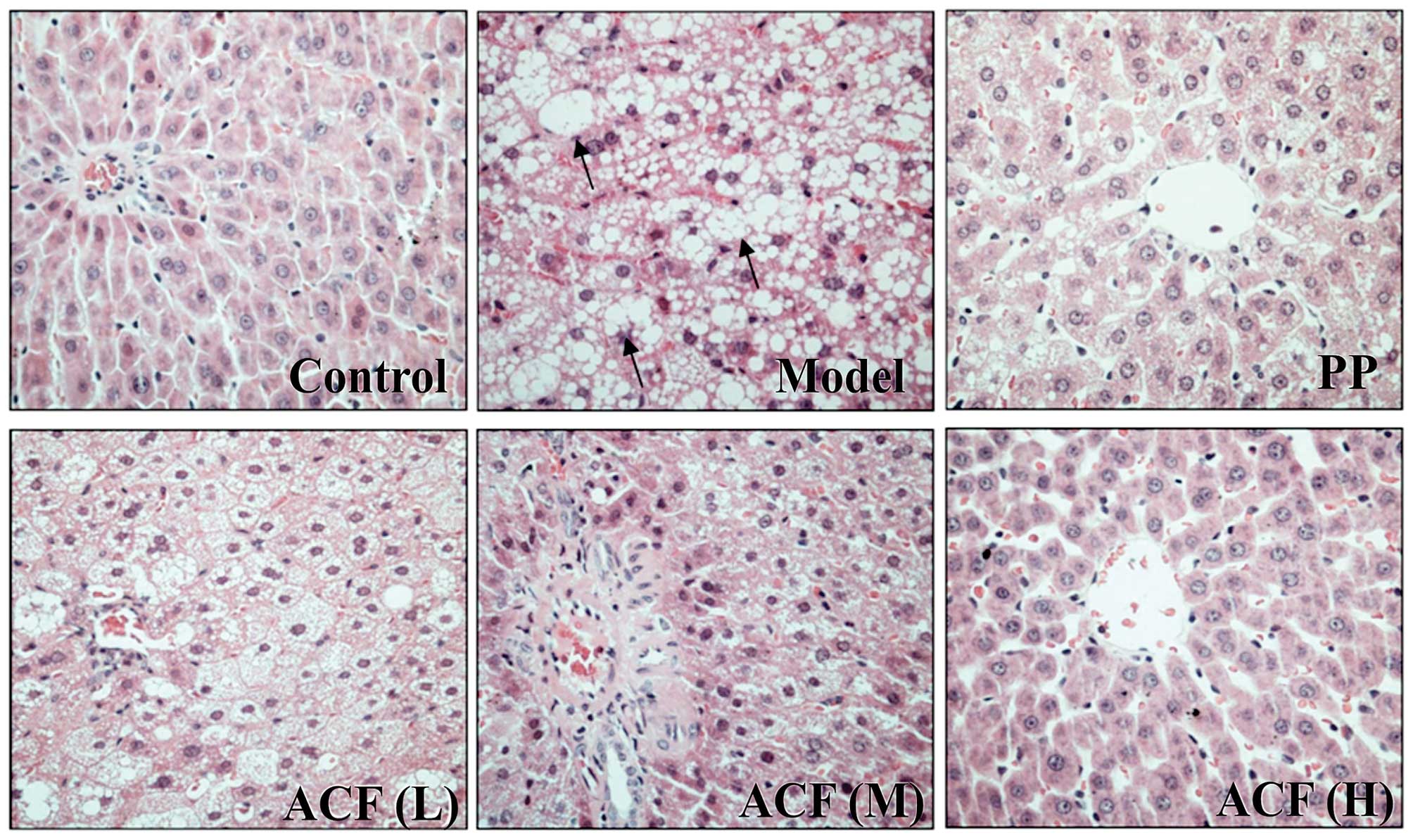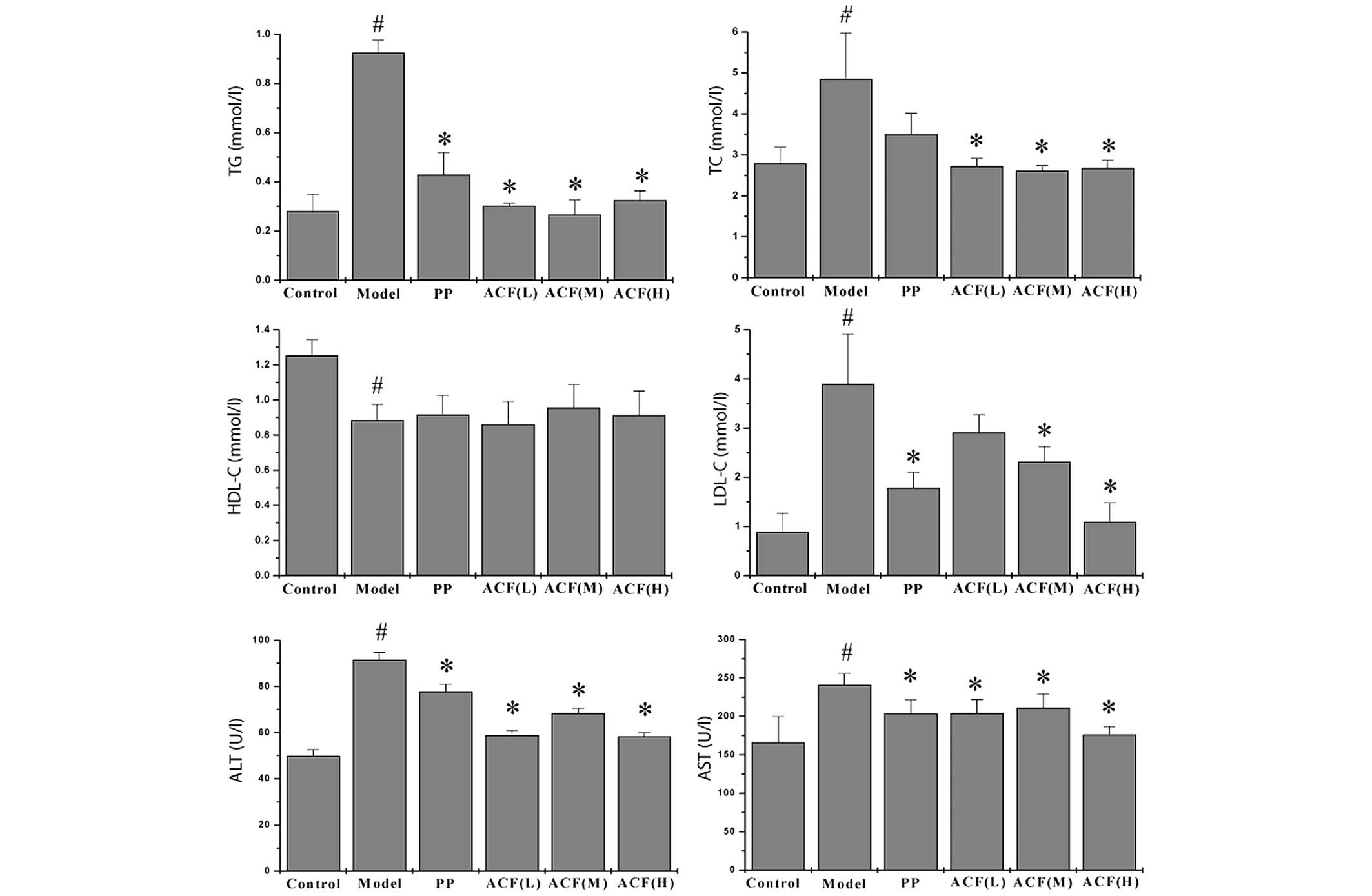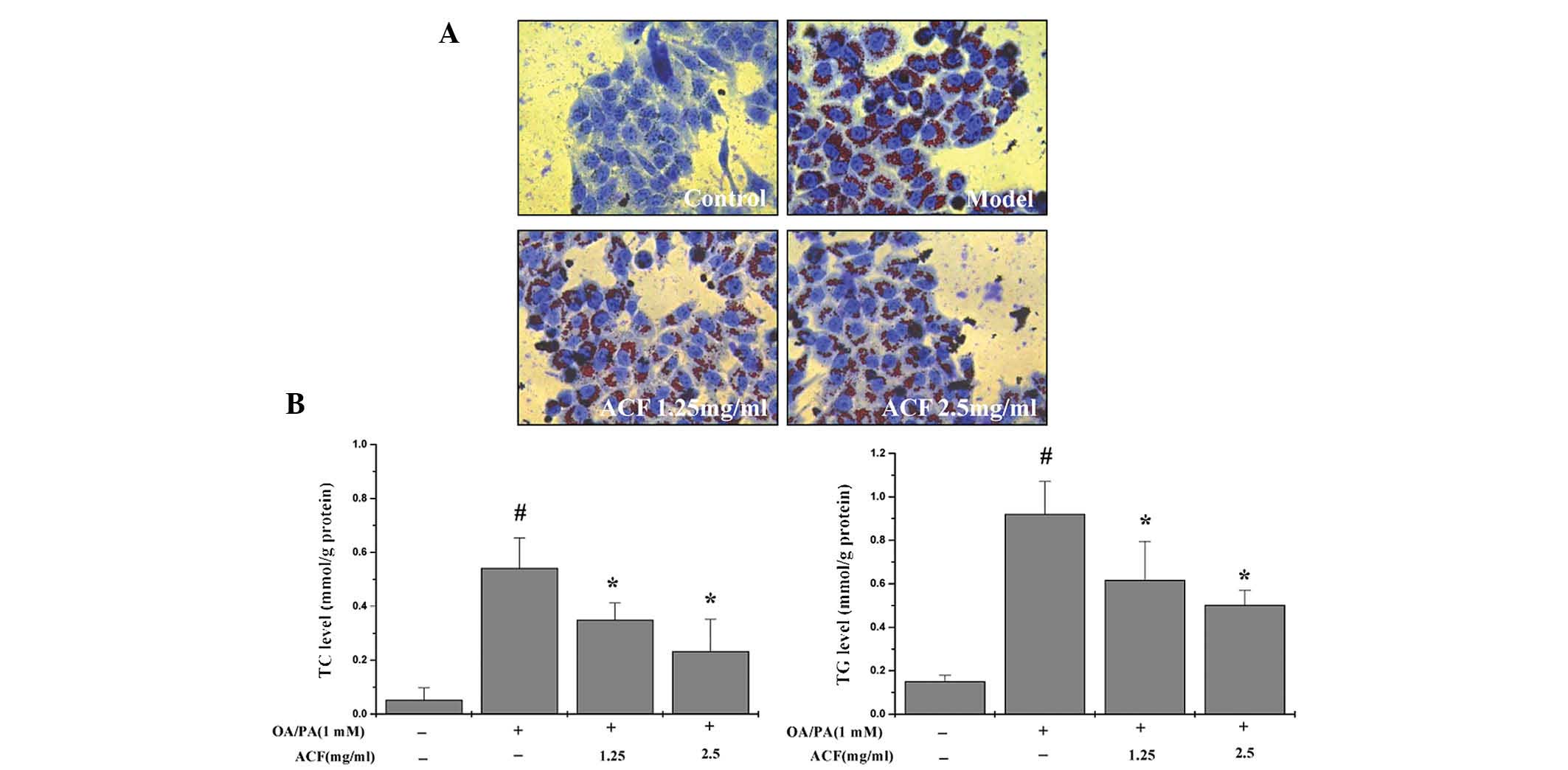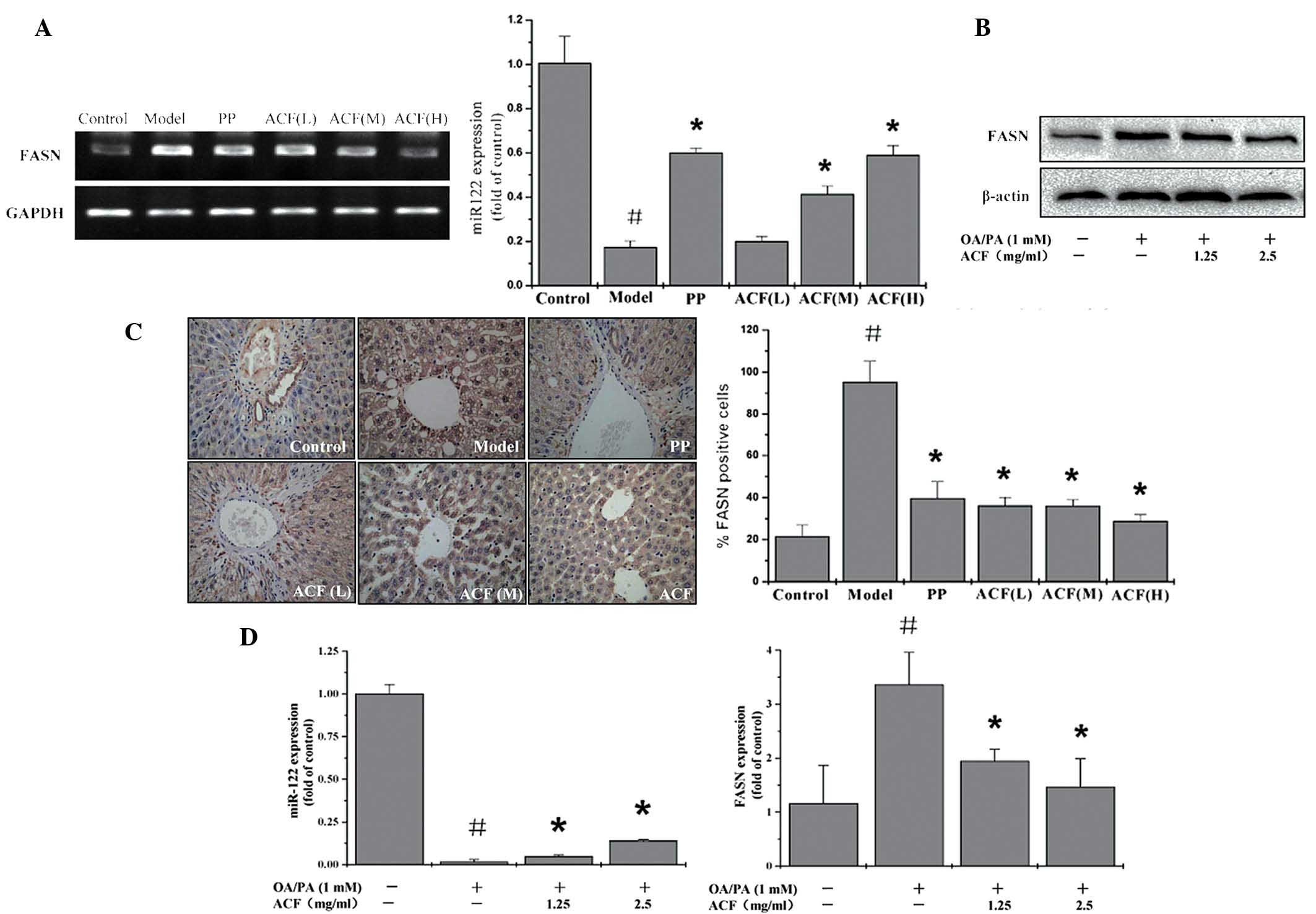|
1
|
Cheung O and Sanyal AJ: Role of microRNAs
in non-alcoholic steatohepatitis. Curr Pharm Des. 16:1952–1957.
2010. View Article : Google Scholar : PubMed/NCBI
|
|
2
|
Browning JD, Szczepaniak LS, Dobbins R, et
al: Prevalence of hepatic steatosis in an urban population in the
United States: Impact of ethnicity. Hepatology. 40:1387–1395. 2004.
View Article : Google Scholar : PubMed/NCBI
|
|
3
|
Charlton M: Nonalcoholic fatty liver
disease: A review of current understanding and future impact. Clin
Gastroenterol Hepatol. 2:1048–1058. 2004. View Article : Google Scholar : PubMed/NCBI
|
|
4
|
Jun HJ, Kim J, Hoang MH and Lee SJ:
Hepatic lipid accumulation alters global histone h3 lysine 9 and 4
trimethylation in the peroxisome proliferator-activated receptor
alpha network. PLoS One. 7:e443452012. View Article : Google Scholar : PubMed/NCBI
|
|
5
|
Abdelmalek MF and Diehl AM: Nonalcoholic
fatty liver disease as a complication of insulin resistance. Med
Clin North Am. 91:1125–1149. 2007. View Article : Google Scholar : PubMed/NCBI
|
|
6
|
Jin X, Ye YF, Chen SH, Yu CH, Liu J and Li
YM: MicroRNA expression pattern in different stages of nonalcoholic
fatty liver disease. Dig Liver Dis. 41:289–297. 2009. View Article : Google Scholar
|
|
7
|
Lau NC, Lim LP, Weinstein EG and Bartel
DP: An abundant class of tiny RNAs with probable regulatory roles
in Caenorhabditis elegans. Science. 294:858–862. 2001. View Article : Google Scholar : PubMed/NCBI
|
|
8
|
Esau C, Davis S, Murray SF, et al: miR-122
regulation of lipid metabolism revealed by in vivo antisense
targeting. Cell Metab. 3:87–98. 2006. View Article : Google Scholar : PubMed/NCBI
|
|
9
|
Lin J, Liu F and Jiang Y: Antisense
technologies targeting fatty acid synthetic enzymes. Recent Patents
Anticancer Drug Discov. 7:198–206. 2012. View Article : Google Scholar
|
|
10
|
Liu Y, Chen SH, Jin X and Li YM: Analysis
of differentially expressed genes and microRNAs in alcoholic liver
disease. Int J Mol Med. 31:547–554. 2013.PubMed/NCBI
|
|
11
|
Chang CY, Argo CK, Al-Osaimi AM and
Caldwell SH: Therapy of NAFLD: Antioxidants and cytoprotective
agents. J Clin Gastroenterol. 40(Suppl 1): S51–S60. 2006.PubMed/NCBI
|
|
12
|
Caldwell SH, Argo CK and Al-Osaimi AM:
Therapy of NAFLD: Insulin sensitizing agents. J Clin Gastroenterol.
40(Suppl 1): S61–S66. 2006.PubMed/NCBI
|
|
13
|
Sanyal AJ, Campbell-Sargent C, Mirshahi F,
et al: association of insulin resistance and mitochondrial
abnormalities. Gastroenterology. 120(5): 1183–1192. 2001.
View Article : Google Scholar : PubMed/NCBI
|
|
14
|
Pérez-Carreras M, Del Hoyo P, Martín MA,
Rubio JC, Martín A, Castellano G, Colina F, Arenas J and
Solis-Herruzo JA: Defective hepatic mitochondrial respiratory chain
in patients with nonalcoholic steatohepatitis. Hepatology.
38:999–1007. 2003. View Article : Google Scholar : PubMed/NCBI
|
|
15
|
Ji HF, Li XJ and Zhang HY: Natural
products and drug discovery. Can thousands of years of ancient
medical knowledge lead us to new and powerful drug combinations in
the fight against cancer and dementia? EMBO Rep. 10:194–200. 2009.
View Article : Google Scholar : PubMed/NCBI
|
|
16
|
Zhang Y, Zhao J, Zhong X, Zheng H, Li Y,
Liu L, Wan Y, Peng J and Hong Z: Ameliorative potential of
Artemisia capillaris formula on nonalcoholic fatty liver disease in
rats through regulation of fat metabolism. Afr J Tradit
Complementary Altern Med. 12:151–161. 2015.
|
|
17
|
Liu X, Shen T, Wang Z, Zhaung L, Zhang W,
Yu J, Wu J and Zhang S: Hepatitis E virus infection results in
acute graft failure after liver transplantation: A case report. J
Infect Dev Ctries. 2014.8:245–248. View Article : Google Scholar : PubMed/NCBI
|
|
18
|
Ding Y, Xing J, Qiu Z, Wang Y, Zhang Y,
Fang Y, Peng X, Long Y and Deng P: Radioactive iodine therapy
without recent antithyroid drug pretreatment for hyperthyroidism
complicated by severe hyperbilirubinemia due to hepatic
dysfunction: Experience of a Chinese medical center. Endocr Pract.
Oct. 22–2015.Epub ahead of print. PubMed/NCBI
|
|
19
|
Zhao J, Zheng H, Liu Y, Lin J, Zhong X, Xu
W, Hong Z and Peng J: Anti-inflammatory effects of total alkaloids
from Rubus alceifolius Poir [corrected]. on non-alcoholic fatty
liver disease through regulation of the NF-κB pathway. Int J Mol
Med. 31:931–937. 2013.PubMed/NCBI
|
|
20
|
Li Y, Zhao J, Zheng H, Zhong X, Zhou J and
Hong Z: Treatment of nonalcoholic fatty liver disease with total
alkaloids in Rubus aleaefolius Poir through regulation of fat
metabolism. Evid Based Complement Alternat Med.
2014:7685402014.PubMed/NCBI
|
|
21
|
Lin J, Zhao J, Li T, Zhou J, Hu J and Hong
Z: Hepatoprotection in a rat model of acute liver damage through
inhibition of CY2E1 activity by total alkaloids extracted from
Rubus alceifolius Poir. Int J Toxicol. 30:237–243. 2011. View Article : Google Scholar : PubMed/NCBI
|
|
22
|
Bonkovsky HL, Jawaid Q, Tortorelli K, et
al: Non-alcoholic steatohepatitis and iron: Increased prevalence of
mutations of the HFE gene in non-alcoholic steatohepatitis. J
Hepatol. 31:421–429. 1999. View Article : Google Scholar : PubMed/NCBI
|
|
23
|
Wan Y, Liu LY, Hong ZF and Peng J: Ethanol
extract of Cirsium japonicum attenuates hepatic lipid accumulation
via AMPK activation in human HepG2 cells. Exp Ther Med. 8:79–84.
2014.PubMed/NCBI
|
|
24
|
Gómez-Lechón MJ, Donato MT,
Martínez-Romero A, Jiménez N, Castell JV and O'Connor JE: A human
hepatocellular in vitro model to investigate steatosis. Chem Biol
Interact. 165:106–116. 2007. View Article : Google Scholar
|
|
25
|
Zheng L, Lv GC, Sheng J and Yang YD:
Effect of miRNA-10b in regulating cellular steatosis level by
targeting PPAR-alpha expression, a novel mechanism for the
pathogenesis of NAFLD. J Gastroenterol Hepatol. 25:156–163. 2010.
View Article : Google Scholar
|
|
26
|
Livak KJ and Schmittgen TD: Analysis of
relative gene expression data using real-time quantitative PCR and
the 2(-Delta Delta C(T)) method. Methods. 25:402–408. 2001.
View Article : Google Scholar
|
|
27
|
Brunt EM: Nonalcoholic steatohepatitis:
Pathologic features and differential diagnosis. Semin Diagn Pathol.
22:330–338. 2005. View Article : Google Scholar
|
|
28
|
Neuschwander-Tetri BA: Nonalcoholic
steatohepatitis and the metabolic syndrome. Am J Med Sci.
330:326–335. 2005. View Article : Google Scholar : PubMed/NCBI
|
|
29
|
Tan XJ, Li Q, Chen XH, et al: Simultaneous
determination of 13 bioactive compounds in Herba Artemisiae
Scopariae (Yin Chen) from different harvest seasons by HPLC-DAD. J
Pharm Biomed Anal. 47:847–853. 2008. View Article : Google Scholar : PubMed/NCBI
|
|
30
|
Esau C, Kang X, Peralta E, et al:
MicroRNA-143 regulates adipocyte differentiation. J Biol Chem.
279:52361–52365. 2004. View Article : Google Scholar : PubMed/NCBI
|
|
31
|
Krützfeldt J, Rajewsky N, Braich R, et al:
Silencing of microRNAs in vivo with 'antagomirs'. Nature.
438:685–689. 2005. View Article : Google Scholar : PubMed/NCBI
|
|
32
|
Chang J, Guo JT, Jiang D, Guo H, Taylor JM
and Block TM: Liver-specific microRNA miR-122 enhance the
replication of hepatitis C virus in nonhepatic cells. J Virol.
82:8215–8223. 2008. View Article : Google Scholar : PubMed/NCBI
|
|
33
|
Lagos-Quintana M, Rauhut R, Yalcin A,
Meyer J, Lendeckel W and Tuschl T: Identification of
tissue-specific microRNAs from mouse. Curr Biol. 12:735–739. 2002.
View Article : Google Scholar : PubMed/NCBI
|
|
34
|
Cheung O, Puri P, Eicken C, Contos MJ,
Mirshani F, Maher JW, Keller JM, Min H, Luketic VA and Sanyal AJ:
Nonalcoholic steatohepatitis is associated with altered hepatic
microRNA expression. Hepatology. 48:1810–1820. 2008. View Article : Google Scholar : PubMed/NCBI
|
|
35
|
Lewis AP and Jopling CL: Regulation and
biological function of the liver-specific miR-122. Biochem Soc
Trans. 38:1553–1557. 2010. View Article : Google Scholar : PubMed/NCBI
|



















